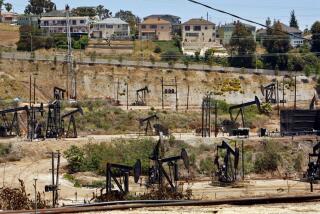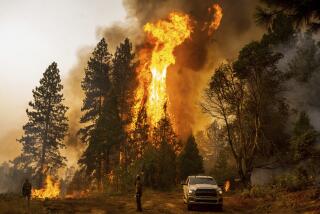Experts Warn of Global Fallout From Warfare : Environment: Scientists say that smoke from blazing Kuwait oil fields could affect the climate.
- Share via
LONDON — A war in the Persian Gulf could turn Kuwaiti oil fields into a vast inferno, which would cause an environmental disaster of global proportions, scientists and oil experts warned Wednesday.
Delegates to an international science conference in London on the possible impact of a gulf war said that pollution from blazing oil installations and from oil spillages could threaten the world’s ecology and even cause disastrous climate changes.
“If, as is likely, Iraq has mined the Kuwaiti oil wells, the resulting fires could burn almost 3 million barrels of oil a day from nearly 1,000 oil installations,” said John Cox, a chemical engineer with experience in gulf oil fields.
Some military strategists believe Iraqi President Saddam Hussein has had Kuwaiti oil installations booby-trapped since his troops invaded the neighboring emirate Aug. 2 and could blow them up if attacked by opposing forces in the gulf.
Cox said the pall of smoke from the inferno would be as great as any from a nuclear explosion, blotting out sunlight and causing gulf temperatures to fall by up to 68 degrees Fahrenheit.
Some delegates said they plan to draw up a study on the environmental costs of a gulf conflict to try to draw the world back from the brink of war.
The fires could also disrupt weather patterns in other parts of the world and lead to the failure of annual rains in Asia upon which thousands depend for food, Cox told the conference, which was attended by about 30 scientists and engineers, mostly British, in fields ranging from nuclear physics to meteorology.
The fires would also produce clouds of poisonous carbon monoxide and sulfur dioxide, which causes acid rain.
A former engineer with the Kuwait Oil Company, Basil Butler, also warned of the dangers of blazing oil wells, but he disputed Cox’s prediction that it would take years to fully extinguish the fires.
Butler, now employed by British Petroleum, estimated that it would take nine months to put out the fires.
Dr. Abdullah Toukan, secretary-general of Jordan’s Higher Council for Science and Technology, said that in addition to smoke pollution, there could be spillages into gulf waters of up to 2 million barrels of oil a day.
The resulting environmental disaster would be many times worse than the 1989 oil spill in Valdez, Alaska, which was the worst in U.S. history, he said.
More to Read
Sign up for Essential California
The most important California stories and recommendations in your inbox every morning.
You may occasionally receive promotional content from the Los Angeles Times.













